Daily
Bethlehem Guys
Early last evening I spoke with Bethlehem director Yuval Adler and Ali Waked, the Palestinian journalist with whom Adler co-wrote the screenplay. I wrote a few days ago that Bethlehem, Israel’s official entry for the Best Foreign Language Film Oscar, is “a lucid, tightly wound thriller that regards the Israeli-Palestinian conflict through a filter of double-agenting and family matters and betrayal and anxiety,” and that the Academy’s foreign language committee “would be foolish not to pay heed.”
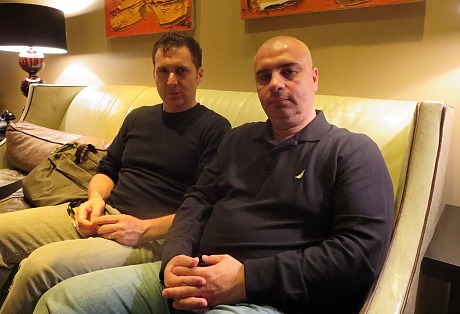
(l.) Bethlehem director Yuval Adler, (r.) co-screenwriter Ali Waked at Hollywood Roosevelt hotel — Friday, 11.8, 5:55 pm.
Adler and Waked are in Los Angeles for screenings of Bethlehem at AFI Fest. We kicked it around for 40 minutes in the lower lobby of the Roosevelt hotel. This was just before the David O. Russell event upstairs.
One Of Those Slow, Gunky, Depressing Days
I couldn’t file anything today after the first two articles. I spent a good portion of the morning writing and thinking about Spike Lee‘s Oldboy, which I was generally okay with and actually impressed by to a certain extent (it’s nowhere near as problematic as the buzz might suggest). Except for the ending. But I can’t get into it until embargo day so that’s that. And then I spent some time trying to decide if it’s worth going to the Berlin Film festival in February in order to see George Clooney‘s Monuments Men and Wes Anderson‘s The Grand Budapest Hotel. And then I got un-invited to a screening of Delivery Man, the Vince Vaughn-starring remake of Starbuck. And then…I don’t want to talk about it. Now I have to get down to the Hollywood Roosevelt for a Bethlehem interview, and then I’ll be hitting a reception for American Hustle‘s David O. Russell at 7pm (also at the Roosevelt) followed by a Russell chit-chat at the Egyptian at 9 pm.
Worst “Successful” Action Director Of All Time?
Paul Greengrass, director of The Bourne Supremacy (’04) and The Bourne Ultimatum (’07), is a seasoned maestro of grade-A political action thrillers. If you were to make another Bourne film, you’d want Greengrass directing and Matt Damon back for one more paycheck. If you’re determined to make a sequel to The Bourne Legacy with Jeremy Renner in the lead and you can’t get Greengrass, you would at least want Tony Gilroy to re-deploy. But you certainly don’t want Fast and the Furious franchiser Justin Lin because he’s a low-rent, jizz-whiz director with a sloppy, pseudo-animated videogame attitude about shooting chases and fights and shoot-outs. Lin would rather shoot himself in the mouth than direct an action sequence that even occasionally adheres to the laws of physics. All Lin will do is cheapen the franchise and lower the property values. Lin makes Brett Ratner look like Anthony Mann. But of course, the Universal zombie execs want him. He makes action flicks for under-35s who want sequences in which guys leap from one rooftop to another and then do swan dives off 50-story office buildings. He’s an animal. Greengrass to Gilroy To Lin…what a devaluation. Greetings, Mr. Bourne — you are about to become a T-1000 cyborg.

“Rules of Engagement,” My Ass
Everyone presumably knows by now that Peter Berg‘s Lone Survivor (Universal, 12.27) is the story of the failed Operation Red Wings in Afghanistan (June 2005), which resulted in the deaths of three Navy SEALS on the ground and eight more SEALS plus eight U.S. Army Special Ops guys — 19 in all. It’s being sold as a story about the four Navy SEALS on the ground (Mark Wahlberg as Marcus Littrell, Taylor Kitsch as Lt. Michael P. Murphy, Emile Hirsch as Danny Dietz and Ben Foster as Matthew Axelson) who got shot all to pieces, and about how three of them died nobly and bravely.
But if these guys had been more tough-minded (in the “diamond bullet” sense of that term as conveyed by Marlon Brando in Apocalypse Now) and followed some basic strategic wisdom they might not have died at all.
Team Banks All Here
I attended an AFI Fest premiere pre-party this evening for Saving Mr. Banks at the Hollywood Roosevelt Hotel. It began earlyish, around 5:15 pm or so, but it was dark and cool out so who cared? Having seen Banks in London about three weeks ago I decided at the last minute to drive over to an Old Boy screening in West Los Angeles.
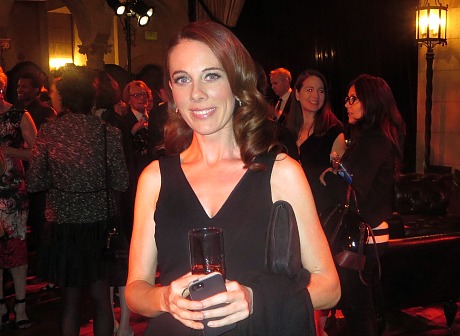
Saving Mr. Banks screenwriter and principal architect Kelly Marcel — Hollywood Roosevelt hotel, Thursday, 12.7, 6:05 pm. Marcel shares screenwriting credit with Sue Smith, but the dramatic focus and the voice of the movie that premiered tonight is pretty much all Marcel’s.
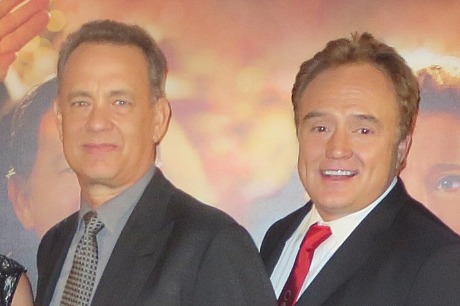
Banks star Tom Hanks, costar Bradley Whitford.
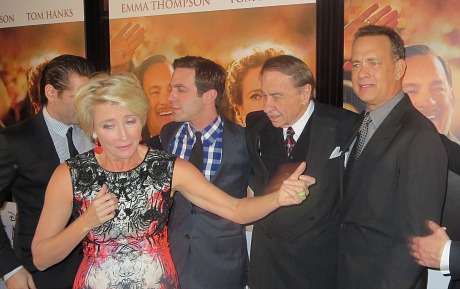
(l. to r.) Colin Farrell (partially hidden), Emma Thompson, Mary Poppins songwriter Richard Sherman, Tom Hanks.
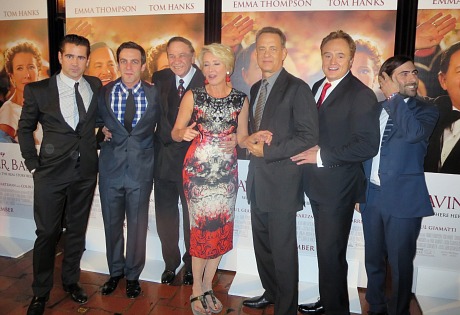
(l. to r.) Colin Farrell, B.J. Novak, Richard Sherman, Emma Thompson, Tom Hanks, Bradley Whitford, Jason Schwartzman.
Permission Granted
I just got an email from Nicolas Winding Refn‘s assistant, informing that Refn’s wife, Liv Corfixen, “is making a documentary about what life is like married to an artist like Nicolas surrounding the making of Only God Forgives. She has footage of Nicolas reading aloud a portion of your review of OGF that was published on Hollywood-Elsewhere.com and would love to include it in the film. Copied on this email is Nicolas’ producing partner Lene Borglum. She would like to have your permission to use the quote from your review and can answer any questions you have.” My reply: “Funny. Sure, use away.”
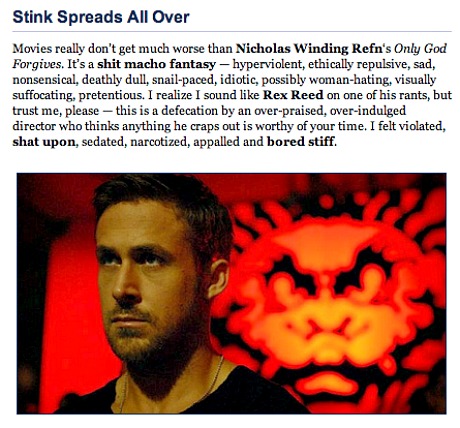
Rewatch, Reflect
“I was mildly okay with Ron Howard‘s Rush (Universal 9.20) for the most part, but I haven’t felt moved to review it. I’m still not there. I’m waiting for the insight or ignition. I admired the craft and verisimilitude and the ’60s/’70s vibe, and I enjoyed the visceral vroom-vroom…but it didn’t stay with me, possibly because I didn’t sense much of an undercurrent (or at least an undercurrent that meant something to me personally). Is it because I didn’t care all that much about James Hunt (Chris Hemsworth) or Niki Lauda (Daniel Bruhl)? The former struck me as an instinctual, good-natured, hot-dog libertine with a lion-like mane; the other as an edgy, screwed-down, not-especially-likable hardass.” — from 9.22.13 post called “Waiting Game.’
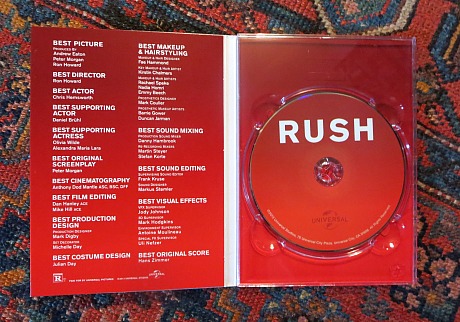
Black-and-White Scope
This has more of a sense of fluid visual grace and…whatever, more of a certain directorial authority and panache and je ne sais quoi than some Liam Neeson paycheck action movies I could point to, even though it’s just an effing Dolce & Gabbana ad. I would have been repelled if McConaughey had made a move on Johansson but he didn’t so we’re cool. “The dress likes you back”?
Want Ad
Marketing-Publicity Department for Major-League Film Distribution Company Seeking Administrative Assistant. Only the most alert, polite, focused and fastidious applicants will be considered. Nice smile, social skills, strong organizational tendencies. Efficient but without any pre-set attitudes or belief systems. We basically want someone who is, to coin a term, “soft clay.” We would prefer a candidate who doesn’t have a college degree in film studies or film criticism. In fact, the less you know (or the less you pretend to know) the better. Absolutely no knowledge of online movie websites or names of significant journalist-critics preferred. Should any journalist-critic happen to call, we would prefer that they talk to someone who has no clue who they might be, who will ask what dead-tree publication they work for, who will ask them to spell their name and the name of their publication or website, and who will also feign total ignorance about anything and everything including whether it’s sunny or raining outside. Long hours guaranteed, but well worth the investment for the contacts you’ll acquire. A minimum of two work-related references required.
Somebody Yelled “No!”
The first thing I said as I watched this trailer for Akiva Goldsman‘s Winter’s Tale (Warner Bros., 2.14.14) was “uh-oh…romantic time travel…based on a 30 year-old novel….a cousin of Jeannot Szwarc‘s Somewhere In Time.” (Which I’ve always respected, by the way.) The second thing I said was “who’s the babe?” Answer: 24 year-old British actress Jessica Brown Findlay. Then I flinched when Colin Farrell, marooned in 2013, half-moaned and teared up when he saw Findlay’s photo. Steve McQueen would have never done that — never “show” emotion, always suggest it by covering it up. Another rule of thumb is that any film in which any character loudly yells out “no!” (as in “no, don’t let that happen!” or “no, don’t let him get away!”) is a problem. Winter’s Tale is therefore (and I’m not delighted to imply this) most likely a problem.
Lay Off Padilha’s Robocop…For Now
Being a youngish guy, Rope of Silicon‘s Brad Brevet seems vaguely invested in geek-friendly movie fare (anything CG-driven or based on a superhero comic-book or franchise of any kind), or is at least more willing to tolerate this crap than I am. So when a guy like Brevet says he’s not that aroused by the latest trailer for Jose Padilha‘s Robocop (MGM, 2.12.14), that could mean trouble. I am personally unable to consider this possibility as I’m a huge fan of Padilha‘s Elite Squad: The Enemy Within. I interviewed Padilha in January 2012 — here‘s the piece.
